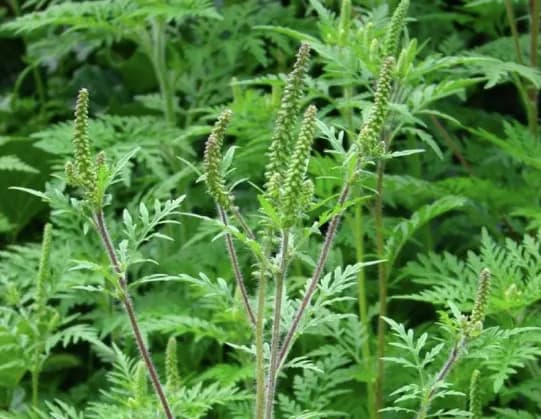Quarantine in the capital due to ragweed: why the plant is dangerous
Kyiv • UNN
The capital is taking measures to eradicate the allergenic ragweed plant. The authorities are calling for a fight against the plant and warning of fines for quarantine violations.

Kyiv has been quarantined to combat ragweed. The authorities are implementing a set of measures to destroy and prevent the spread of this allergenic plant throughout the city. UNN explains why this plant is dangerous.
Ragweed is an annual plant that can reach a height of up to 2 meters. It has distinctive dissected leaves and small greenish flowers that form spike-shaped inflorescences. Ragweed reproduces by seeds, which can remain viable in the soil for 5 to 40 years. One ragweed plant can produce up to 50 thousand seeds in one season. The seeds are spread by wind, water, as well as by animals and people (on vehicles, shoes, etc.).
Ragweed pollen, one of the world's strongest allergy triggers, reaches its peak in August and September. Ragweed and wormwood, along with cereal grasses, are among the top allergens. Wind-blown ragweed pollen is believed to be particularly aggressive: a single plant can release a billion pollen grains, but a concentration of just six to ten grains per cubic meter of air is enough to cause allergic symptoms.
How ragweed allergy manifests itself
Usually, allergy to this plant manifests itself with symptoms similar to those of other types of allergyto pollen :
- Sneezing;
- Undead;
- Nasal congestion;
- Headache;
- Eye irritation ;
- Soreness/itching in the throat.
The reaction can be quite severe and long-lasting. In addition, ragweed pollen can significantly worsen the condition of people with asthma.
Sometimes people who have allergic symptoms to pollen suffer from oral allergy syndrome - when they consume certain fruits, vegetables or nuts, they experience swelling of the lips, tongue or even throat. The reason is that the proteins in these foods are similar to pollen and trigger an immune system response.
Experts advise to closely monitor such reactions of the body, especially in the period from the end of summer, and to consult doctors to alleviate their condition.
Preventive measures
Experts advise to stay outdoors less during the highest pollen levels in the air, which is the morning for ragweed.
During this time, try to keep the windows in your home and car closed.
Change your clothes as soon as you get home. Wash your face and hands after every visit outside.
Ragweed control
To prevent the further spread of ragweed, it should be controlled annually before flowering and seed formation by pulling out by the roots, regular mowing or sowing with a mixture of lawn grasses, and to prevent contamination of soil and agricultural products
In Kyiv, a set of measures is envisaged to combat ragweed, including the destruction of ragweed pockets and its further spread. In particular, these include:
- destruction of the plant by pulling and burning, and in case of severe infestation - mowing or pulling out by the roots;
- creation of phytocoenoses of perennial grasses capable of suppressing ragweed;
- use of chemical control agents.
The KCSA emphasized that only herbicides that are officially authorized in Ukraine are to be used when applying chemicals. Also, on the eve of ragweed flowering, the city began treating the areas where ragweed was found with a special preparation based on the natural mineral bischofite. After its action, the ragweed withers, its pollen becomes sterile, i.e. does not cause allergies. Also, the areas where ragweed was found were mowed, and in small areas, the plant was pulled out by the root.
In addition, according to the Law of Ukraine “On Plant Quarantine”, measures to destroy quarantine organisms on land plots are carried out by and at the expense of landowners and land users or tenants of land plots. Residents of private sectors and owners of land plots bear personal administrative responsibility for violation of phytosanitary legislation. Article 105 of the Code of Ukraine “On Administrative Offenses” provides for the imposition of a fine in the amount of 3 to 10 tax-free minimum incomes of citizens and for officials - from 8 to 15 tax-free minimum incomes of citizens.